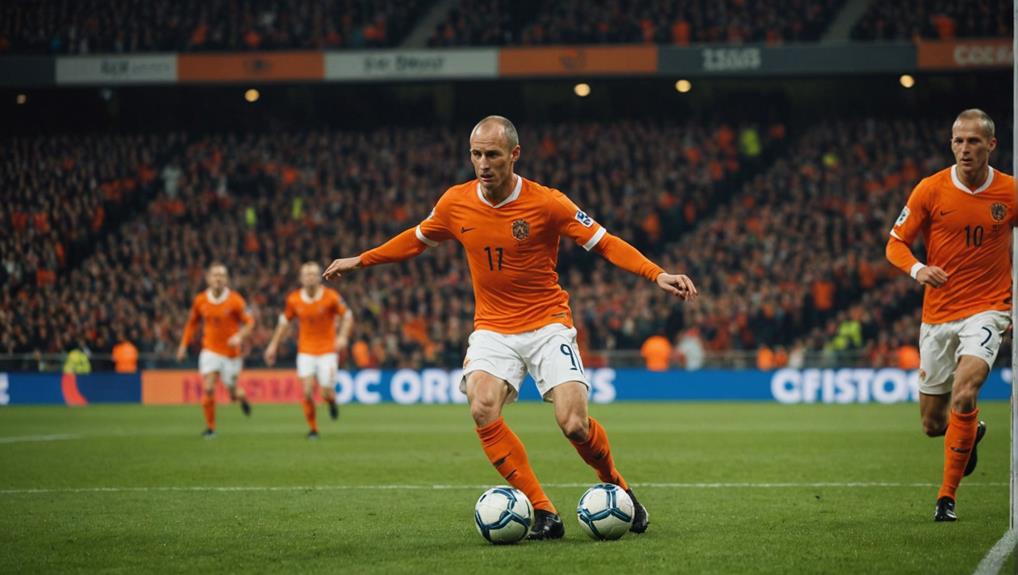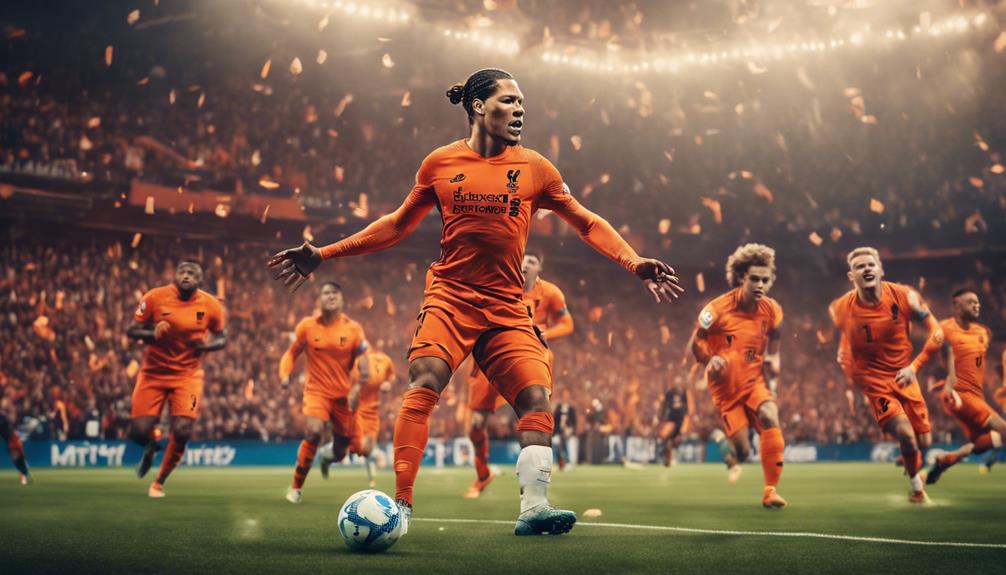
The Rise of Netherlands Soccer: Key Moments and Players
July 26, 2024Embark on a journey through the rise of Netherlands football, starting with the innovative Total Football tactics of the 1970s pioneered by Johan Cruyff. Witness pivotal moments like the strategic advancements and player brilliance that have shaped Dutch football history. Explore iconic players such as Dennis Bergkamp, Ruud Gullit, and Marco van Basten, who have left a lasting mark with their unique talents and contributions. Dive deeper into the influence of visionary coaches like Rinus Michels and the current resurgence guided by Ronald Koeman. The enthralling evolution of Dutch football awaits, with stories of successes, challenges, and a promising future.
Netherlands Soccer in the 1970s
In the 1970s, Netherlands soccer revolutionized the game with the adoption of the Total Football strategy under coach Rinus Michels. This innovative style of play emphasized a fluid attacking strategy that saw players interchange positions seamlessly, creating a dynamic and unpredictable offense.
The Netherlands soccer team's performance in the 1974 World Cup final against West Germany showcased their prowess, even though they faced defeat. Despite this setback, they continued to impress on the international stage, finishing third in the 1976 European Championship.
By the time they reached the 1978 World Cup final against Argentina, the Dutch team had firmly established themselves among the footballing elite. Though they fell short once again, their presence in back-to-back World Cup finals cemented their reputation as a force to be reckoned with in international competition.
The 1970s marked a golden era for Netherlands soccer, characterized by their daring and inventive approach to the game.
Total Football Revolution and Innovations
Amidst the changing landscape of soccer tactics, the Total Football revolution spearheaded by Rinus Michels brought about a new era of innovation and creativity in Dutch soccer.
Coined by Michels, Total Football emphasized role interchangeability and fluid player positions, revolutionizing soccer tactics with a focus on possession, pressing, and attacking. This Dutch approach promoted high technical skill levels, versatility, and collective creativity.
Known for space exploitation and imaginative play, Total Football produced legendary players like Johan Cruyff. The innovative style not only transformed Dutch soccer but also left a lasting impact on tactics and strategies worldwide.
Michels and Cruyff became synonymous with this dynamic and innovative style, showcasing the Dutch commitment to attacking football and a fluid style of play that maximized the use of space on the field. This approach not only entertained fans but also set a benchmark for future generations of players and coaches in the soccer world.
Notable Players in the 1990s

Notable players who made significant contributions to Dutch soccer in the 1990s include Dennis Bergkamp, Ruud Gullit, Marco van Basten, Frank Rijkaard, and Patrick Kluivert.
Bergkamp's technical skill and goal-scoring ability were pivotal for the Netherlands during this period. Gullit, a versatile player, left a lasting impact on the Dutch national team with his influential style of play. Van Basten, known as a clinical finisher and the hero of the 1988 European Championship, continued to shine in the 1990s. Rijkaard, a versatile midfielder with defensive prowess, provided stability and leadership to the Dutch squad. Kluivert, a talented striker, emerged as a key figure with his knack for scoring vital goals.
Together, these players formed a formidable core for the Dutch team in the 1990s, showcasing a blend of skill, versatility, and goal-scoring prowess that elevated Netherlands soccer on the international stage.
Coaches and Management Dynamics
Coaches and management dynamics have played an essential role in shaping the evolution of Dutch soccer over the years. Rinus Michels, credited as the pioneer of Total Football, left an indelible mark by leading the Dutch national team to victory in the 1988 UEFA European Championship. Following in his footsteps, Guus Hiddink, Frank Rijkaard, and Louis van Gaal each brought their unique coaching styles to the team, contributing significantly to the development of Dutch soccer.
Bert van Marwijk's leadership was particularly remarkable as he guided the Netherlands to the 2010 World Cup final, where they narrowly missed out on the title in a memorable match against Spain. Despite challenges faced by coaches like Dick Advocaat and Danny Blind, their tenures prompted shifts in the team's performance and management dynamics, paving the way for new strategies and approaches.
In 2018, Ronald Koeman took the helm as head coach with the aim of steering the team through a period of recovery and resurgence, continuing the legacy of impactful coaching in Dutch soccer.
Recent Tournament Highlights and Defeats

You've explored the Netherlands' journey through recent tournaments, from the highs of the 2010 World Cup to the lows of Euro 2012. Victories over strong teams like Brazil showcased the team's capabilities, while defeats to Portugal and Russia raised concerns about their performance.
As you examine the tournament highlights and defeats, consider the players' contributions and the tactical strategies employed that shaped the team's outcomes.
Tournament Victories and Losses
The Netherlands' recent tournament performances have showcased a mix of impressive victories and disappointing defeats. In the Euro 2004 and Euro 2008 competitions, the Dutch team suffered losses to Portugal and Russia, respectively.
However, they redeemed themselves with notable victories over Brazil in the 2014 World Cup and France in previous tournaments. The 2010 FIFA World Cup saw the Netherlands reach the final but ultimately fall short to Spain in a closely fought match.
Throughout these tournaments, key players like Dennis Bergkamp, Ruud Gullit, and Marco van Basten made significant contributions to the team's successes, creating memorable moments for Dutch soccer fans.
These victories and losses have been pivotal in shaping the Netherlands' soccer legacy, showcasing both the team's resilience in triumph and their ability to learn and grow from defeats.
Player Contributions and Impact
During recent tournaments, key players in the Netherlands soccer team have made significant contributions and left a lasting impact on the team's performance. Wesley Sneijder and Arjen Robben played pivotal roles in the team's journey to the 2010 World Cup final, showcasing their skills and determination.
Dennis Bergkamp's unforgettable goal against Argentina in the 1998 World Cup quarter-final stands out as a defining moment in recent Dutch soccer history. Despite the defeat to Spain in the 2010 World Cup final, notable victories over Brazil and France highlighted the Dutch team's quality and resilience on the international stage.
Additionally, the contribution of key players like Robin van Persie has been instrumental in the team's success and impact in recent tournament performances. These standout performances and memorable victories have solidified the reputation of these players as legends in Dutch soccer.
Tactical Strategies Employed
In recent tournaments, the Netherlands soccer team has implemented a possession-based style with a strong emphasis on technical elegance and spatial control in their tactical approach. Despite showcasing tactical creativity and individual brilliance in victories over France and Italy, the team faced setbacks with defeats to Italy, Portugal, and Russia.
These losses highlighted the challenges the team encountered in adapting their strategies to different opponents. The defeats to Italy, Portugal, and Russia emphasized the need for strategic innovations and a more resilient approach in critical matches.
Notable moments like Bergkamp's goal against Argentina underscored the team's ability to display individual brilliance within their tactical framework. Coaches such as Guus Hiddink, Louis van Gaal, and Dick Advocaat played pivotal roles in influencing the team's tactical strategies during recent tournament performances, guiding them through both successes and defeats with their expertise and experience.
Dutch Soccer's Evolutionary Path
You're about to uncover the fascinating evolution of Dutch soccer, from Johan Cruyff's groundbreaking influence to Rinus Michels' Total Football philosophy.
These key figures have shaped the Dutch playing style, emphasizing fluidity, spatial awareness, and technical finesse.
Evolution of Playing Style
The transformation of Dutch soccer's playing style commenced in the 1960s under the influential guidance of Johan Cruyff. Total Football, a revolutionary playing philosophy, emphasized fluid player positions and spatial control, reshaping Dutch soccer tactics.
The Dutch prioritized possession, passing, and technical elegance, hallmarking their unique style. Louis van Gaal's team faced criticism for straying from traditional Dutch soccer, opting for a more reactive approach at times.
Dutch soccer's evolution showcases a rich history of innovation and strategic development, reflecting a constant drive for progress.
- Johan Cruyff's Influence: Pioneered the shift towards a more dynamic style of play.
- Total Football Revolution: Introduced fluid player positions and spatial control.
- Emphasis on Possession and Passing: Highlighted the Dutch commitment to maintaining control of the game.
- Criticism of Van Gaal: Louis van Gaal's deviation from traditional Dutch soccer tactics.
Impact of Total Football
Total Football's impact reverberates through Dutch soccer's evolutionary journey, shaping a legacy of innovation and strategic prowess. Coined by Rinus Michels, this tactical approach revolutionized Dutch soccer in the 1970s with its emphasis on possession, attacking play, and role interchangeability. The philosophy not only opened defenses with imaginative strategies but also promoted high levels of creativity and technical skill among players.
Total Football's influence went beyond just the tactics used on the field. It instilled a culture of teamwork, unity, and collective effort within Dutch soccer, fostering a collaborative environment where players worked together seamlessly to achieve success. This emphasis on innovative strategies and cohesive teamwork propelled Dutch soccer to new heights, producing legendary players and unforgettable moments that showcased the power of this revolutionary approach.
The legacy of Total Football continues to inspire generations of players and coaches, solidifying its place in the annals of soccer history.
Influence on Modern Tactics
Throughout Dutch soccer's evolutionary path, the influence of Total Football on modern tactics is unmistakably profound. The Dutch national team's adoption of Total Football revolutionized soccer tactics, emphasizing spatial control, positional fluidity, and technical skill.
This innovative approach to the game under Rinus Michels' guidance shaped modern tactical strategies, influencing how teams play and strategize today. The tactical philosophy of Total Football unlocked new possibilities in attacking play, encouraging creativity, teamwork, and intelligent decision-making on the field.
- Total Football revolutionized Dutch soccer tactics
- Emphasis on spatial control and positional fluidity
- Influence on modern tactical strategies
- Prioritization of technical skill in gameplay
Impact of Johan Cruyff

Johan Cruyff's innovative techniques transformed Dutch soccer, shaping a new era of tactical prowess and fluidity. His introduction of Total Football revolutionized the game, emphasizing fluidity and positional interchangeability.
Cruyff's influence extended beyond the pitch, inspiring a new approach to team tactics in international soccer. He brought spatial control and technical elegance to the forefront, defining the Dutch soccer identity.
By focusing on player development, Cruyff laid the foundation for the Netherlands' rise in the global soccer arena. His unconventional playing style and tactical innovations optimized the Total Football philosophy, prioritizing possession, pressing, and attacking strategies.
Cruyff's impact continues to resonate in the modern game, showcasing the enduring legacy of his contributions to Dutch soccer.
Decline, Recovery, and Future Prospects
Amidst a notable decline in international performance, the Netherlands faced the challenge of rebuilding and restoring their competitive edge under new coaching leadership. After failing to qualify for Euro 2016, the Dutch national team entered a phase of recovery led by Ronald Koeman in 2018.
The coaching stints of Guus Hiddink and Danny Blind during the decline were marred by challenges and criticism, ultimately leading to Blind's dismissal following a loss to Bulgaria in 2017. This event underscored the necessity for a fresh approach and renewed focus within the team.
Looking forward, the future prospects for the Netherlands national team involve a process of rebuilding and regaining their competitive edge on the international stage.
- Netherlands failed to qualify for Euro 2016, signaling a decline in international performance.
- Ronald Koeman assumed the role of coach in 2018 to guide the team through a recovery phase.
- Guus Hiddink and Danny Blind faced challenges and criticism during their coaching stints amid the decline.
- Blind's dismissal post a defeat to Bulgaria in 2017 highlighted the need for a fresh approach.
Conclusion
As you reflect on the rise and fall of Netherlands soccer, one key player stands out: Johan Cruyff. His impact on the sport and his revolutionary style of play have left a lasting legacy on Dutch football.
Just as he inspired a generation of players, his influence continues to shape the future of the game in the Netherlands.
His story serves as a reminder of the power of innovation and perseverance in the world of soccer.


